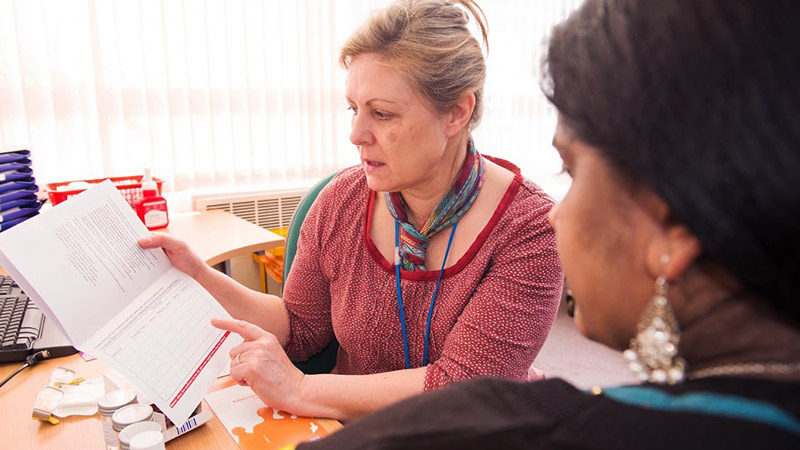Management in Health and Social Care
MSc or PGDip or PGCert
Key facts
Course code
MSC-MHS, PGC-MHS, PGD-MHS
Start dates
January 2024 / September 2024 / January 2025 / September 2025
Application deadline
1 August (for a September start) 1 December (for a January start)
Location
Course length
Full time: 12 months
Part time: 2 to 5 years
Academic level
7
Academic credits
60, 120, 180
Overview
Good leaders make good decisions. Good decisions improve health care environments and drive them forward to serve society more fully. Study with us on our Management in Health and Social Care MSc to uncover dynamic approaches to health and social care management and gain the expertise you need to thrive as a leader.
As you study this programme, you’ll develop critical thinking in leadership, looking at how you can influence the various problems we face in health and social care. From interventions that promote working from home, to advocating for CPD training for healthcare professionals, you’ll explore innovative new ways to tackle the problems we face today.
This course will equip you to become a leader in both small teams and larger operational organisations. You’ll understand your role as mentor and you’ll develop skills in strategic management.
From writing business plans, to managing human resources, this interdisciplinary programme of study will give you the skills you need to succeed in a wide range of health and social care management roles.

How to apply
Entry requirements
You must have:
- a UK BSc/BA degree, or equivalent learning experience, from a recognised international institution, or a professional qualification applicable to health or social care
- 6 months' experience as a student, employee or volunteer within the health/social care sector (European or International; public, private or voluntary).
If you do not hold a UK BSc/BA degree or equivalent overseas degree from a recognised institution, you should contact the Programme Administrator for further information.
International applications
If you need a student visa to enter the UK you will need to meet the UK Visas and Immigration minimum language requirements as well as the University's requirements.
Pathways courses for international and EU students
We offer a range of courses to help you meet the entry requirements for your postgraduate course and also familiarise you with university life in the UK.
Take a Pre-Master's course to develop your subject knowledge, study skills and academic language level in preparation for your master's course.
If you need to improve your English language, we offer pre-sessional English language courses to help you meet the English language requirements of your chosen master’s course.
Terms and Conditions of Enrolment
When you accept our offer, you agree to the Terms and Conditions of Enrolment. You should therefore read those conditions before accepting the offer.
English language requirements
For applicants whose first language is not English, an Academic IELTS score of 6.5 (with 6.5 in Reading and Writing, and 6.0 in Listening and Speaking) is required.
English requirements for visas
If you need a student visa to enter the UK you will need to meet the UK Visas and Immigration minimum language requirements as well as the University's requirements. Find out more about English language requirements.
Tuition fees
Questions about fees?
Contact Student Finance on:
Tuition fees
Fees quoted are for the first year only. If you are studying a course that lasts longer than one year your fees will increase each year.
How and when to pay
Tuition fee instalments for the semester are due by the Monday of week 1 of each semester. Students are not liable for full fees for that semester if they leave before week 4. If the leaving date is after week 4, full fees for the semester are payable.
- For information on payment methods, please see our Make a Payment page.
- For information about refunds, please visit our Refund policy page
Financial support and scholarships
Additional costs
Please be aware that some courses will involve some additional costs that are not covered by your fees. Specific additional costs for this course are detailed below.
Learning and assessment
During this course you’ll examine how different leaders operate, how you can employ different project management tactics, and how you can create systems to achieve operational goals.
As well as leadership and project management, you’ll also study strategic planning, finance and managing resources. You’ll explore coaching and mentoring and learn how to support staff on a one-to-one or one-to-many basis.
You’ll gain extensive research skills, allowing you to question the evidence people are using to make decisions, and find solutions of your own. During this programme you will also have the opportunity to specialise in areas like managing clinical trials and have the flexibility to do independent studies.
Before you finish this course you will also write a dissertation, which enables you to develop a more specialised and deeper understanding of management in your chosen field. This is an opportunity to identify areas of particular interest and tackle them with the support of management experts.

Study modules
The modules listed below are for the master's award. For the PGDip and PGCert awards your module choices may be different. Please contact us for more details.
Learning and teaching
You will learn through the following methods:
- lectures
- seminars
- learning sets
- blended and online learning.
Each module amounts to about 200 hours of study time. This is delivered through morning and afternoon sessions and online learning activities.
You can tailor your learning to cover topics suited to your professional development needs, through the course's flexible structure.
You will maximise benefits to your professional role through the use of real workplace issues, adding value to assignments. You can then apply your learning and evidence-based management to your organisation.
Student profiles
Programme changes:
On rare occasions we may need to make changes to our course programmes after they have been
published on the website. For more information, please visit our
changes to programmes page.
Careers and professional development
Graduates of our leadership in health and social care degree develop a vast amount of expertise. You’ll be able to look for a range of different opportunities. Students have gone on to lead departments in areas such as:
- local authorities,
- public health services,
- social care,
- charities,
- data analysis,
- health care management,
- health education.
Why Oxford Brookes University?
Leadership Skills
Through the course you'll develop the ability to lead health and social care teams to improve mental and physical health.
A global perspective
We take a global viewpoint, comparing contrasting health systems to give you a bigger insight into cutting-edge management practices and interventions.
The Health and Wellbeing Research Group
Be inspired by the experts at The Health and Wellbeing Research Group, a body that specialises in studying prevention efforts for physical and psychological health and wellbeing.
A recognised qualification
This interdisciplinary Master of Sciences degree is a globally recognised qualification that covers a range of leadership disciplines.
A stepping stone to a rewarding career
Whether you want to advance in a current clinical role, or are looking to enter the health or social care sector, this course will give you the skills to make it happen.
